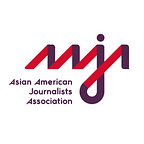We hereby refuse to forget the incarceration of Japanese Americans
On this year’s Japanese American Day of Remembrance, we highlight a book talk about Frank Abe’s “We Hereby Refuse: Japanese American Resistance to Wartime Incarceration.”
By Yi-Shen Loo, AAJA 40th Anniversary and Communications Fellow
Each year on February 19, we honor the 120,000 Japanese Americans who were incarcerated during World War II under Executive Order 9066. Longtime AAJA member Frank Abe works tirelessly to ensure that the history of Japanese American incarceration isn’t forgotten — especially the resistance that isn’t always covered in mainstream media.
On Sunday, February 13, Eastwind Books and the Oakland Asian Cultural Center hosted a virtual Book Talk on “The Bay Area Allies,” featuring Frank Abe, co-founder of AAJA Seattle and author of the graphic novel “We Hereby Refuse: Japanese American Resistance to Wartime Incarceration,” published in May 2021. The book highlights Japanese American resistance to wartime incarceration through the stories of Hajime Jim Akutsu, Hiroshi Kashiwagi and Mitsuye Endo, who were incarcerated during World War II.
Abe was in conversation with Sadako Nimura Kashiwagi, Hiroshi’s wife, who was incarcerated at Tule Lake incarceration camp in California at a young age. Hiroshi, who passed away in October 2019, had resisted government pressure to sign a loyalty oath.
When speaking about the graphic novel, Kashiwagi said “It was very difficult for me to read, because it brought back many memories. I was only 8 at the time, but it’s amazing how much I do remember… I read the book and I was going, ‘I’m living this.’”
Also joining Abe and Kashiwagi were Kathleen Purcell and Wayne Collins Jr. Their parents, James Purcell and Wayne Collins, respectively, were attorneys who contested the incarceration of Japanese Americans and represented Mitsuye Endo and Hiroshi Kashiwagi.
Purcell spoke about her father’s work. According to Purcell, in the last interview he gave, he was asked what lessons he hoped the American consciousness would take away from the incarceration of its own citizens, fueled by war hysteria, prejudice and political failure. His answer? “How the government treats people starts with how the people treat each other.”
Her father represented Mitsuye Endo in Ex parte Endo, which resulted in the Supreme Court ruling that the government could not detain citizens who were loyal to the United States in December of 1944.
“You can never forget, and never forgive,” Collins Jr. said. “You have to keep, always, before you, the need to defend every human being’s civil and human rights. And that’s the primary dedication that all of us owe each other.”
When Hiroshi Kashiwagi refused to fill out the “loyalty questionnaire,” which asked incarcerees if they would serve in the army, swear allegiance to the United States and “forswear any form of allegiance or obedience to the Japanese emperor,” he was labeled as a “No-No boy,” those who answered “no” to both questions. Kashiwagi was forced to renounce his United States citizenship, and was subsequently ostracized for being “disloyal.” Wayne Collins fought to have Kashiwagi’s citizenship restored.
About the “No-No boys,” Abe said, “This is still a story that is mired in misinformation, myth, and disinformation.” The notion of Japanese Americans being “disloyal” was fabricated by the United States government in an attempt to conflate Japanese Americans with Japan’s opposing forces during the war, Abe explained. The U.S. government, blinded by the belief of the perpetual foreigner, wrongly assumed that Japanese Americans would retain loyalty to a country which most had never even been to before.
“It was the [US] government that was disloyal to [Japanese Americans], disloyal to the constitution, disloyal to the principles of this nation.”
To conclude the book talk, Abe drew parallels between the incarceration of Japanese Americans during World War II and the detention of asylum seekers at the border today: the FBI sweeping through Japanese American communities in Southern California has become ICE agents breaking down the doors of immigrant homes; the families broken up by internment have become families separated at the border.
“Race continues to be an issue,” he said, “and the needs of those targeted on the basis of their race, religion or immigration status is something that we must continue to keep fighting for.”
As we continue to stand with our AAPI communities in the face of today’s injustice, remembering the stories of resistance is crucial to ensure that this history is not forgotten, whether on the Japanese American Day of Remembrance, or otherwise.
Watch a recording of the book talk, and purchase “We Hereby Refuse” online here.
Liked this piece? Share it on social media and follow AAJA Defined as we continue to chat with AAPI journalists and share their stories.
Yi-Shen Loo is the 40th Anniversary and Communications Fellow at AAJA and a senior at UC Berkeley. She is based in California. Find her on Instagram.
